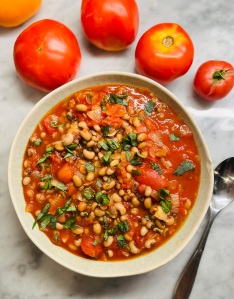 I recently read Michael Twitty’s latest fabulous book, Koshersoul, a personal and culinary exploration as a Black Jewish man. Beautifully written with lots of recipes that trace the intersections and influences of African foods, African-American cuisine, Jewish Southern dishes, and Sephardic foods. One ingredient he wrote about was black eyed peas, commonly found in African, African-American and Sephardic and Mizrachi dishes. Black eyed peas are commonly eaten at Rosh Hashana as a symbol of a prosperous new year.
I recently read Michael Twitty’s latest fabulous book, Koshersoul, a personal and culinary exploration as a Black Jewish man. Beautifully written with lots of recipes that trace the intersections and influences of African foods, African-American cuisine, Jewish Southern dishes, and Sephardic foods. One ingredient he wrote about was black eyed peas, commonly found in African, African-American and Sephardic and Mizrachi dishes. Black eyed peas are commonly eaten at Rosh Hashana as a symbol of a prosperous new year.
 The recipe below is from Gil Marks’ Olive Trees and Honey cookbook with a couple of minor changes including adding lots of fresh basil since I have an abundance that I’m growing and use at every opportunity. He reminisces about eating black eyed pea dishes like this one during his childhood visits to his grandmother in Georgia. This recipe is called “Turkish black eyed peas with tomatoes” and also offers variations for an Indian and Sephardic recipes.
The recipe below is from Gil Marks’ Olive Trees and Honey cookbook with a couple of minor changes including adding lots of fresh basil since I have an abundance that I’m growing and use at every opportunity. He reminisces about eating black eyed pea dishes like this one during his childhood visits to his grandmother in Georgia. This recipe is called “Turkish black eyed peas with tomatoes” and also offers variations for an Indian and Sephardic recipes.
And click here for more of Rosh Hashana recipes such as apple galette, beet carpaccio, and my “Garden of Eden” dish.
Shana tova!
Ingredients
1 can black eye peas
3 tbsp olive oil
1 medium onion, chopped
3 cloves garlic, minced
14 ounces plum tomatoes
1 tsp salt
1/4 tsp sugar (optional)
large bunch of fresh basil, chopped or torn
1/4 cup bean broth
- Chop the onions and garlic. Place a large saucepan over medium heat and add the olive oil. Add the onions and cook until partially soft. Add the garlic and continue to cook until onions are translucent and soft.
- Add the tomatoes, bean broth, salt, sugar and bring to a boil. Mash the tomatoes into smaller pieces.
- Add the peas and most of the basil. Cover and reduce to low and simmer about 20 minutes.
- Sprinkle with the remaining fresh basil before serving.


Sounds very interesting… and different!
<
div dir=”ltr”>
<
blockquote type=”cite”>
LikeLike
Thank you! 🙂
LikeLike
Now this looks like something I could actually make! I will certainly try! Interesting story too!
Thanks,
Mom
<
div dir=”ltr”>
<
blockquote type=”cite”>
LikeLike